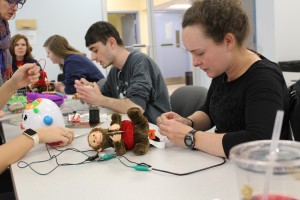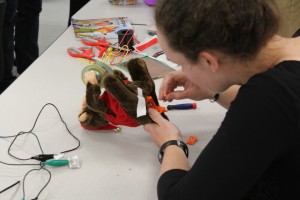
By Sydney McCabe | The Duquesne Duke
Remember walking into Toys R Us as a kid, feeling like the possibilities for fun were endless? It’s a feeling that epitomizes childhood wonder and excitement, and it’s a feeling that every child should be entitled to. At least that’s how Duquesne’s START-Play Hackers feel, and they have made it their mission to make sure every child has that experience.
START-Play Hackers is a new club on campus, headed by club president and senior occupational therapy major Alexandra Schriefer and physical therapy professor Regina Harbourne. As Schriefer explained, the name of the club echoes their primary mission: to hack functional toys for children with disabilities so they can start to play!
START-Play grew out of a grant Harbourne received to conduct intervention studies for children with disabilities. The club works with families in the community, as well as institutions such as the Western Pennsylvania School for the Blind, to make adapted toys for children with disabilities and motor impairments at a low cost. Whereas modified switches and controls can cost parents $50 in addition to the price of the toys, the START-Play Hackers use ingenuity and low cost resources to customize the toys to be both functional and affordable.
“The point of the club is we want to [make adapted toys] as cheap as possible, and that is where the hackers part comes in,” Harbourne said. “It encourages a kind of a do-it-yourself in order to get children to start to play.”
Harbourne comes to the monthly meetings prepared with a new project and the Hackers — students from different science disciplines like occupational therapy, physical therapy or bio-medical engineering — come with ingenuity and a willingness to bounce ideas off each other. Harbourne specifically noted the importance of the interdisciplinary nature of the individuals involved with START-Play.

“We have students who really know the human body and what to expect from human behavior, and then more engineering-minded students who come with these really big, out-of-the-box ideas, and they work it out together,” Harbourne explained.
The club is still in its infancy — the constitution was penned this past summer — but Schriefer pointed out that they have already completed some lofty projects, most notably the manipulation of a motorized toy car to make it suitable for a child with muscular atrophy.
“For this particular child, we … replaced the small push button with a large red switch button in the center of the car since the child did not have enough strength to press the small button with his fingers,” Schriefer said. “[And we] added a contoured back for head and trunk support and a seatbelt and foam-covered guardrails on each side for safety.”
Although the club has been off to a great start, Harbourne noted one challenge they do face is not having a designated space for the “hacking.”
“It takes longer than an hour meeting to figure out what we are going to do [to the toy] and to then actually do it,” she said. “Our students are busy, so what we really need is a space where they can work on the project when it’s convenient.”
Despite the challenge, both Harbourne and Schriefer said they were confident in the future success and the overall mission of the club.
“This organization is extremely rewarding and works to solve real-life problems while helping children to do what they do best: play,” Schriefer said.



